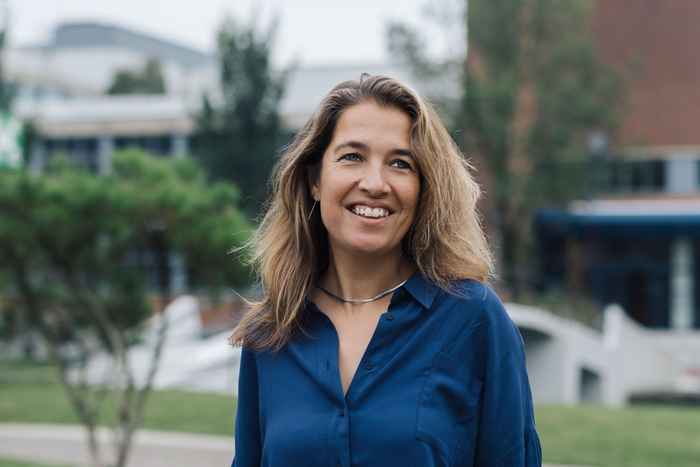‘It’s important that children broaden their horizons'
Catherine van Beuningen created professor by special appointment of Global Citizenship and Bilingual Education, effective 1 September
2 September 2024

Van Beuningen explains why this research is so important: ‘In today’s society, we’re increasingly interacting with people from different backgrounds and cultures. It’s important for children and young people to learn to understand others and to be understood by others themselves. To do so, they need to develop knowledge, skills and attitudes that broaden their horizons. Language plays a big role in this.’
By creating cohesion between school subjects, we can make students better understand how complicated the world is
Connecting school subjects
One of the central questions in her research as a professor is how schools can make global citizenship part of their teaching effectively. Van Beuningen stresses the importance of connecting different subjects. ‘It is precisely by creating cohesion between school subjects that we can make students better understand how complicated the world is.’
Besides her appointment as a professor at the University of Amsterdam, Van Beuningen is also a lecturer at the Amsterdam University of Applied Sciences, allowing her to combine the knowledge and expertise of both institutions. ‘I look forward to working with colleagues and students from both the UvA and the AUAS. This combined position offers a unique opportunity to leverage the strengths of both institutions.’
Global citizenship research can make a positive contribution to answering important social questions about inclusion and equal opportunities
Close cooperation with schools
Van Beuningen will work closely with schools, especially from Nuffic’s networks, to formulate research questions that are directly relevant to teaching practice. ‘Topics such as diversity and social justice are given explicit attention in global citizenship teaching. A key question is how this attention can contribute positively to inclusion and equal opportunities,’ she explains.
With her research, Van Beuningen also hopes to contribute to national curriculum innovations. ‘We want to find out how to combine the new goals for citizenship and language teaching in such a way that it is meaningful and workable for teachers and learners.’
About Catherine van Beuningen
Catherine van Beuningen studied General Linguistics at Utrecht University and obtained her doctorate from the University of Amsterdam in 2011 for a study on the effect of feedback on multilingual learners’ written language skills. During and after the pursuit of her doctorate, Van Beuningen worked as an assistant professor and as a lecturer and postgraduate researcher at the UvA. She has been with the Faculty of Education at the Amsterdam University of Applied Sciences since 2013, first as a senior lecturer and researcher of Language Teaching and Multilingualism and since October 2023 as a professor of Language Development and Multilingualism. Her research interests include multilingual language didactics, multilingual assessment and dealing with language diversity in educational and parenting fields.